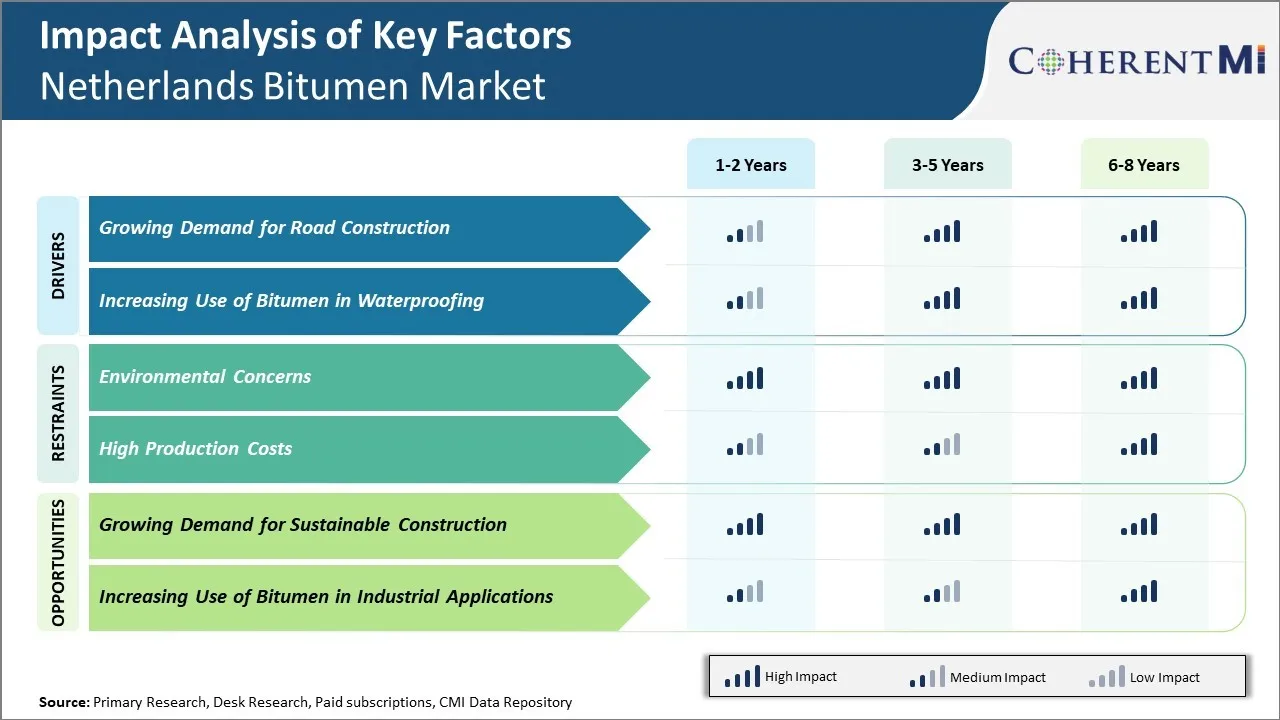Netherlands Bitumen Market Trends
Market Driver - Growing Demand for Road Construction
The Netherlands has witnessed significant growth in road construction activities over the past few years which has driven the demand for bitumen in the country. With increasing urbanization and industrialization, the need for better road infrastructure to support the growing transportation needs has risen steadily. The government has recognized the need to expand and upgrade the road networks and has allocated sizable funds towards various road construction projects.
As per the estimates from the Dutch Ministry of Infrastructure and Water Management, the government had earmarked about €6.5 billion annually between 2020-2023 for the construction and maintenance of road networks across the Netherlands. A major portion of these funds has been utilized for flagship projects such as the construction of the A12 motorway connecting Utrecht and Arnhem which opened in 2021. The ongoing expansion and renovation of the road connecting Schiphol airport and Amsterdam has also contributed towards higher bitumen usage.
The future trends also remain positive as the vision of the Dutch government is to develop a robust inter-city transportation grid along with upgrading existing roads to reduce traffic congestion.
Market Driver – Increasing Use of Bitumen in Waterproofing
The use of bitumen in waterproofing applications has been growing rapidly in the Netherlands in recent years. Bitumen is increasingly being used for waterproofing roofs, basements, terraces and other structures due to its excellent waterproofing and corrosion resistant properties. It adheres well to various building materials like concrete, wood, metal etc. and forms an effective barrier against water seepage and moisture ingress.
Some of the key factors driving the higher use of bitumen for waterproofing include growth in construction activities in the country as well as rising awareness about the need for effective waterproofing solutions to protect infrastructure from damage. The Netherlands has witnessed steady growth in new residential and commercial construction post pandemic in 2022 according to the Dutch Central Bureau of Statistics.
Government regulations stipulating the use of certified waterproofing products on infrastructure projects has further propelled the demand. According to a report by Rijkwaterstaat, the executive agency of the Dutch Ministry of Infrastructure and Water Management, over 75% of the large infrastructure projects in 2022 incorporated certified bitumen membranes for waterproofing critical areas such as tunnels, bridges and hydraulic structures.

Market Challenge – Environmental Concerns
Environmental concerns surrounding bitumen are significantly restraining the growth of Netherlands Bitumen Market. One of the major concerns is the emission of greenhouse gases from bitumen extraction and production processes. Bitumen production requires a lot of energy and heat which leads to high carbon emissions. According to the report published by Netherlands Environmental Assessment Agency in 2022, the emission from bitumen production facilities alone accounted for over 5% of the country's total industrial greenhouse gas emissions in 2021. The agency has recommended switching to more sustainable materials and processes to meet the country's climate targets under Paris Agreement.
Additionally, the extraction and mining of bitumen poses threat to local biodiversity. The areas surrounding the bitumen mines often contain fragile ecosystems and extraction damages the natural habits. As per the data from Netherlands Environmental Protection Agency published in 2021, over 10,000 hectares of forest land was cleared for bitumen mining in the last decade. This destruction of green cover adversely impacts local flora and fauna. Several environmental groups are protesting against proposed expansion of bitumen mines citing ecological degradation.
Market Opportunity – Growing Demand for Sustainable Construction
The growing demand for sustainable construction presents a great opportunity for the Netherlands bitumen market. In recent years, there has been a strong push towards more environmentally friendly construction practices in the Netherlands. The Dutch government has implemented strict regulations and policies to reduce emissions from buildings and infrastructure. All new residential and commercial projects are now required to meet minimum energy efficiency standards and make use of renewable materials where possible.
This shift towards sustainable construction is driving increased demand for products that can help builders construct greener and more resilient buildings and roads. Bitumen, being a widely used binder in asphalt production and waterproofing, has the potential to play a crucial role in sustainable construction when derived from recycled materials. Using recycled bitumen extracted from existing road surfaces and post-consumer waste reduces the need to mine for new bitumen resources. It also lowers greenhouse gas emissions since less refined bitumen needs processing. As environmental regulations tighten, builders will seek out such climate-friendly bitumen alternatives to remain compliant.
The Netherlands government data shows the percentage of construction and demolition waste being recycled rose from 60% in 2015 to almost 70% in 2020.